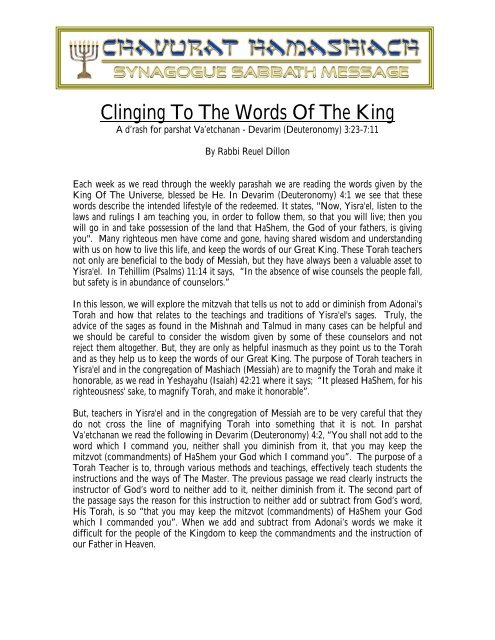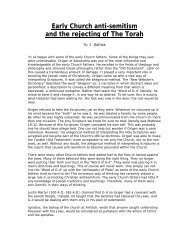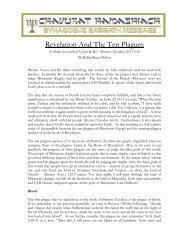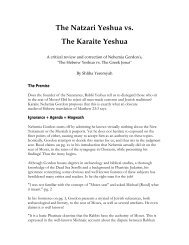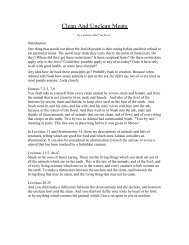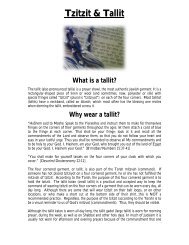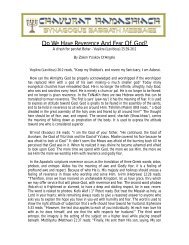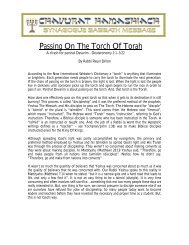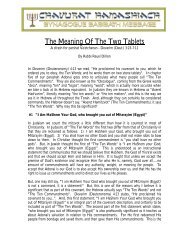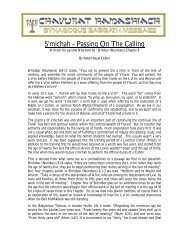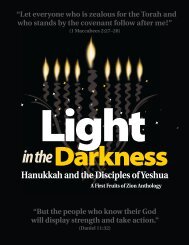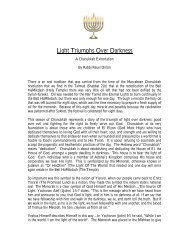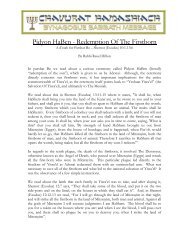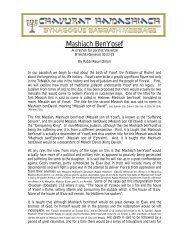Clinging To The Words Of The King
Clinging To The Words Of The King
Clinging To The Words Of The King
Create successful ePaper yourself
Turn your PDF publications into a flip-book with our unique Google optimized e-Paper software.
<strong>Clinging</strong> <strong>To</strong> <strong>The</strong> <strong>Words</strong> <strong>Of</strong> <strong>The</strong> <strong>King</strong><br />
A d’rash for parshat Va’etchanan - Devarim (Deuteronomy) 3:23-7:11<br />
By Rabbi Reuel Dillon<br />
Each week as we read through the weekly parashah we are reading the words given by the<br />
<strong>King</strong> <strong>Of</strong> <strong>The</strong> Universe, blessed be He. In Devarim (Deuteronomy) 4:1 we see that these<br />
words describe the intended lifestyle of the redeemed. It states, "Now, Yisra'el, listen to the<br />
laws and rulings I am teaching you, in order to follow them, so that you will live; then you<br />
will go in and take possession of the land that HaShem, the God of your fathers, is giving<br />
you". Many righteous men have come and gone, having shared wisdom and understanding<br />
with us on how to live this life, and keep the words of our Great <strong>King</strong>. <strong>The</strong>se <strong>To</strong>rah teachers<br />
not only are beneficial to the body of Messiah, but they have always been a valuable asset to<br />
Yisra'el. In Tehillim (Psalms) 11:14 it says, “In the absence of wise counsels the people fall,<br />
but safety is in abundance of counselors.”<br />
In this lesson, we will explore the mitzvah that tells us not to add or diminish from Adonai's<br />
<strong>To</strong>rah and how that relates to the teachings and traditions of Yisra'el's sages. Truly, the<br />
advice of the sages as found in the Mishnah and Talmud in many cases can be helpful and<br />
we should be careful to consider the wisdom given by some of these counselors and not<br />
reject them altogether. But, they are only as helpful inasmuch as they point us to the <strong>To</strong>rah<br />
and as they help us to keep the words of our Great <strong>King</strong>. <strong>The</strong> purpose of <strong>To</strong>rah teachers in<br />
Yisra'el and in the congregation of Mashiach (Messiah) are to magnify the <strong>To</strong>rah and make it<br />
honorable, as we read in Yeshayahu (Isaiah) 42:21 where it says; “It pleased HaShem, for his<br />
righteousness' sake, to magnify <strong>To</strong>rah, and make it honorable”.<br />
But, teachers in Yisra'el and in the congregation of Messiah are to be very careful that they<br />
do not cross the line of magnifying <strong>To</strong>rah into something that it is not. In parshat<br />
Va’etchanan we read the following in Devarim (Deuteronomy) 4:2, “You shall not add to the<br />
word which I command you, neither shall you diminish from it, that you may keep the<br />
mitzvot (commandments) of HaShem your God which I command you”. <strong>The</strong> purpose of a<br />
<strong>To</strong>rah Teacher is to, through various methods and teachings, effectively teach students the<br />
instructions and the ways of <strong>The</strong> Master. <strong>The</strong> previous passage we read clearly instructs the<br />
instructor of God’s word to neither add to it, neither diminish from it. <strong>The</strong> second part of<br />
the passage says the reason for this instruction to neither add or subtract from God’s word,<br />
His <strong>To</strong>rah, is so “that you may keep the mitzvot (commandments) of HaShem your God<br />
which I commanded you”. When we add and subtract from Adonai’s words we make it<br />
difficult for the people of the <strong>King</strong>dom to keep the commandments and the instruction of<br />
our Father in Heaven.
From this we know that whether it is a Godly friend, your Rabbi or Pastor, or whether it is<br />
the sages as found in Mishnah and the Talmud, we are not to take their traditions,<br />
instructions, and words and hold them with the same authority as our Heavenly Father’s<br />
Word, lest we blur the lines of Biblical authority and find ourselves in danger of adding or<br />
subtracting from Adonai's words, as found in scripture. Anything stated with authority by<br />
our teachers should have basis in the scripture and should serve to accomplish the goals and<br />
purposes of Adonai's mitzvot and instructions. If something taught doesn't serve to<br />
accomplish the purposes and goals of Adonai's <strong>To</strong>rah, than it could be said that such a<br />
teaching or tradition is either adding or taking away from Adonai's words and mitzvot<br />
(commandments).<br />
<strong>The</strong> rabbis, sages, and teachers of Yeshua's day were actually very concerned about this. If<br />
they believed a teacher was misinterpreting scripture or adding or taking away from the<br />
words of the <strong>To</strong>rah, even if it was one letter of the <strong>To</strong>rah, they would cry out accusations<br />
such as, "You are destroying the <strong>To</strong>rah!!" This was taken very seriously because it was and is<br />
believed by the sages and rabbis that with the destroying or abolishing of the <strong>To</strong>rah, so too,<br />
the world is destroyed.<br />
For example, I will quote at length from Midrash Tanchumah 1:1 where it is taught, "This is<br />
what Scripture means when it says: <strong>The</strong> Lord with wisdom founded the earth (Prov. 3:19).<br />
That is, when the Holy One, blessed be He, was about to create this world, He consulted the<br />
<strong>To</strong>rah before embarking upon the work of creation, as it is said, Counsel is mine and sound<br />
wisdom; I am understanding, power is mine (ibid. 8:14)...each crown stroke on the letters of<br />
the <strong>To</strong>rah contains heaps and heaps of law (<strong>To</strong>rah). For example, it is written in the <strong>To</strong>rah:<br />
"Profane not My Holy Name" (Lev. 22:2); but if you should change the chet in the word<br />
"yechallelu" ("profane") into a heh, the word would read "praise," (than meaning, "Praise not<br />
My Holy Name") and you would thereby destroy the world. Conversely, where it is written,<br />
"Let every thing that has breath praise the Lord" (Ps. 150:6), if you should alter the heh in<br />
the word "tehallel" ("praise") into a chet, the word would read "profane," (than meaning,<br />
"Let every thing that has breath profane the Lord"), and you would thereby destroy the<br />
world. Similarly, in the verse, "Hear, O Yisra'el, <strong>The</strong> Lord our God, the Lord is One" (Deut.<br />
6:4), if you should change the dalet in the word "echad" ("one") into a resh, the word would<br />
then read "acher" ("another"), (than meaning, "Hear, O Yisra'el, <strong>The</strong> Lord our God, the<br />
Lord is another (god)") and you would thereby destroy the world, since it is said: "For you<br />
shall not bow to another god" (Exod. 34:14). Midrash Tanchumah goes on to say, "If a<br />
slight change in a single letter can produce such drastic consequences, how much more so<br />
the alteration of a complete word". It is also stated, "...the world was founded upon the<br />
<strong>To</strong>rah. <strong>The</strong> Holy One, Blessed be He, gave the <strong>To</strong>rah to the Yisra'elites so that they might<br />
devote themselves to it and to its commandments day and night, as it is said: "But you shall<br />
meditate therein day and night" (Josh. 1:8). And it says elsewhere: "But his delight is in the<br />
law (<strong>To</strong>rah) of the Lord, and in his <strong>To</strong>rah does he meditate day and night. And he shall be<br />
like a tree planted by streams of water" (Ps. 1:2-3). Furthermore, the world endures because<br />
of those who guard the law (<strong>To</strong>rah), as Hannah stated: "For the pillars of the Earth are the<br />
Lord's" (1Sam. 2:8). Who are the pillars of the Earth? <strong>The</strong>y are the guardians of the <strong>To</strong>rah,<br />
for whose sake alone the world was fashioned, as is said: He has fashioned the world<br />
because of them (ibid.)".
I believe that it was within some of the context of the previous Jewish teaching, which<br />
reflects many of the thoughts and discussion during Yeshua's time, that our Master Yeshua<br />
stated the following in Mattityahu (Matthew) 5:17-18, "Don't think that I have come to<br />
destroy/abolish the <strong>To</strong>rah or the Prophets. I have come not to destroy/abolish but to<br />
complete. Yes indeed! I tell you that until heaven and earth pass away, not so much as a yud<br />
or a stroke will pass from the <strong>To</strong>rah -- not until everything that must happen has happened".<br />
So, Yeshua not only came to preserve each and every letter of the <strong>To</strong>rah, indeed even every<br />
part of each letter found in the <strong>To</strong>rah, but by doing so he also came to rightly interpret the<br />
scripture and teach its proper meaning, and said that while these words and letters of the<br />
<strong>To</strong>rah were being preserved, the Heavens and the Earth would be preserved and would not<br />
be destroyed or would not "pass away". So, this matter of preserving the words of God, and<br />
as Devarim (Deut.) 4:2 says, “You shall not add to the word which I command you, neither<br />
shall you diminish from it..." was much more than just a theological struggle in the eyes of<br />
the sages and in the eyes of our Rabbi Yeshua, because in their view...the very world<br />
depended on it...Likewise, I believe this is the view that we should hold when it comes to<br />
our approach to God's <strong>To</strong>rah and word.<br />
So, what does it mean or what does it look like not to add or subtract from God's word?<br />
Does this mean that we cannot teach or practice anything that is not found directly and<br />
literally in the text of the <strong>To</strong>rah? Some, such as the followers of Kariate Judaism today<br />
would say "yes". But, the ultimate authority on this subject should be our Master Yeshua.<br />
Never mind what the Kariates teach...the question is, what did Yeshua <strong>The</strong> Messiah teach<br />
and practice? We see a sample of how he approached this subject in Mattityahu (Matthew)<br />
chapter five as we continue to read on. In 5:27-28 he states, "You have heard that our<br />
fathers were told, `Do not commit adultery.' But I tell you that a man who even looks at a<br />
woman with the purpose of lusting after her has already committed adultery with her in his<br />
heart". In this text, to those who believe we should only teach and practice that which we<br />
literally find directly in the text of scripture must also conclude that Yeshua <strong>The</strong> Messiah just<br />
added to the text of scripture by saying, "But I tell you that a man who even looks at a<br />
woman with the purpose of lusting after her has already committed adultery with her in his<br />
heart". Where does the <strong>To</strong>rah literally say that?<br />
Likewise, in Mattityahu (Matthew) 5:31-32 Yeshua says, "It was said, `Whoever divorces his<br />
wife must give her a get (divorce document).' But I tell you that anyone who divorces his<br />
wife, except on the ground of fornication, makes her an adulteress; and that anyone who<br />
marries a divorcee commits adultery". Did Yeshua add to scripture by saying, "But I tell you<br />
that anyone who divorces his wife, except on the ground of fornication, makes her an<br />
adulteress; and that anyone who marries a divorcee commits adultery"? In addition, in<br />
Mattityahu 5:33-37 Yeshua teaches us, "Again, you have heard that our fathers were told,<br />
`Do not break your oath,' and `Keep your vows to ADONAI.' But I tell you not to swear at<br />
all -- not `by heaven,' because it is God's throne; not `by the earth,' because it is his<br />
footstool; and not `by Yerushalayim,' because it is the city of the Great <strong>King</strong>. And don't<br />
swear by your head, because you can't make a single hair white or black. Just let your `Yes'<br />
be a simple `Yes,' and your `No' a simple `No'; anything more than this has its origin in<br />
evil". Was Yeshua adding to the <strong>To</strong>rah when he said, "But I tell you not to swear at all..."?<br />
By Yeshua's statements and examples he establishes halachah for us when it comes to our<br />
understanding of what it means to add or subtract from Adonai's words, lest we violate this
command. In each case Yeshua was not abolishing or destroying the words of <strong>To</strong>rah, he<br />
was upholding them by rightly interpreting them and giving us teachings that would serve to<br />
further the purposes and goals of Adonai's <strong>To</strong>rah with the intention of strengthening and<br />
guarding the <strong>To</strong>rah. By doing this He was displaying that he is the ultimate guardian of the<br />
<strong>To</strong>rah!<br />
This same halachah should govern how we employ various godly traditions in our lives.<br />
<strong>The</strong>refore, just because a tradition or teaching is not found literally in the scripture doesn't<br />
automatically mean that we are to reject it. But, if we are to be true talmidim (disciples) of<br />
Yeshua HaMashiach (<strong>The</strong> Messiah), <strong>The</strong> Master…we will not want to throw out a godly<br />
tradition or practice so long as it furthers the goals and purposes of Adonai's <strong>To</strong>rah and does<br />
not transgress the commands of our Heavenly Father. Wasn’t this the halachah and concern<br />
of our Master and <strong>King</strong>? In Mattityahu (Matthew) 15:3 Yeshua <strong>The</strong> Messiah said, “…Why<br />
do you also transgress the command of God on account of your tradition?” In Mattityahu<br />
(Matthew) 15:7-9 after rebuking some of the Perushim (Pharisees) for their hypocrisy,<br />
Yeshua said the following, “You hypocrites! Well did Yeshaiyahu (Isaiah) prophesy of you,<br />
saying, '<strong>The</strong>se people draw near to me with their mouth, and honor me with their lips; but<br />
their heart is far from me. And in vain do they worship me, teaching as doctrine rules made<br />
by men'".<br />
<strong>The</strong> doctrines of men in question are directly tied to the context of transgressing God’s<br />
commandments because of man’s tradition, as found in chapter 15 verse 3. So, does this<br />
mean that all tradition and doctrine not literally found in scripture, even if it is inspired by<br />
the precepts of scripture, is bad? If so, than the Emissary Sha'ul (Paul) would be in trouble<br />
with God. For Rav Sha'ul writes in 1Corinthians 11:1-2, "try to imitate me, even as I myself<br />
try to imitate the Messiah. Now I praise you because you have remembered everything I told<br />
you and observe the traditions just the way I passed them on to you". And, in 2<br />
<strong>The</strong>ssalonians 2:15 he states, "<strong>The</strong>refore, brothers, stand firm; and hold to the traditions you<br />
were taught by us, whether we spoke them or wrote them in a letter". So, obviously a<br />
"tradition" is not the literal word of God, but apparently we can have godly traditions<br />
inspired by the word of God.<br />
Did Yeshua participate or agree with any Pharasaic or rabbinic traditions? Many times<br />
believers in Messiah will automatically equate Pharasaic practice with a bad practice or with a<br />
practice that adds to or takes away from God's word, just as some Messianic believers today<br />
will automatically equate a rabbinic practice or tradition with a wrong anti-scriptural practice.<br />
Rabbinic Judaism is directly descended from the Pharisaic Judaism of Yeshua’s day. In fact,<br />
believe it or not, with a little bit of study one will find that Yeshua leaned towards or agreed<br />
with the teachings of the Perushim (Pharisees) of His day far more than he leaned towards<br />
the teachings of the Tzedukim (Sadducees), whom are the ancient equivalent of the Karaite<br />
Jews of today.<br />
<strong>The</strong> following are just a few examples of the many places (as found in the Talmud) where<br />
Yeshua agreed whole heartedly with Pharasaic and Rabbinic teaching. In Shabbat 151b it is<br />
stated, "He who is merciful to others shall receive mercy from Heaven". In Mattityahu<br />
(Matthew) 5:7 Yeshua states, "How blessed are those who show mercy! for they will be<br />
shown mercy". In Baba Metzia 49a it states, "Let your yes be yes and your no be no". In<br />
Mattityahu (Matthew) 5:37 Yeshua said, "But let your ‘Yes’ be ‘Yes’ and your ‘No’ be ‘No.’
Whatever is more than these is of the evil one". In Baba Bathra 15b it is said, "Do they say,<br />
"Take the splinter out of your eye"? He will retort, "Remove the beam out of your own<br />
eye.". And, in Mattityahu (Matthew) 7:3-5 Yeshua teaches us, "Why do you see the splinter<br />
in your brother's eye but not notice the log in your own eye? How can you say to your<br />
brother, `Let me take the splinter out of your eye,' when you have the log in your own eye?<br />
You hypocrite! First, take the log out of your own eye; then you will see clearly, so that you<br />
can remove the splinter from your brother's eye!".<br />
<strong>The</strong> following are some quotes from a few witnesses who have also diligently studied these<br />
subjects...In his book, Judaism And <strong>The</strong> Christian Predicament, Jewish Author B.Z. Bokser<br />
(Alfred Knopf, York, 1967, pp. 208-209) states, "<strong>The</strong> attitude of Yeshua to the <strong>To</strong>rah is the<br />
very same attitude one finds among the masters of halachah and aggadatta who followed in<br />
the Pharisaic tradition."<br />
In his study and review of the Apostolic writings, Orthodox Jewish scholar Pinchas Lapide<br />
described Yeshua as a traditional, observant Jew (Pinhas Lapide, in Hans Kung, "Jesus in<br />
Conflict," a dialogue between Pinhas Lapide & Hans Kung, in SIGNPOSTS FOR THE<br />
FUTURE, Doubleday, York, 1978, pp. 74-75). In the book "Jesus In Conflict" he stated,<br />
"Jesus never and no where broke the law of Moses, nor did he in any way provoke its<br />
infringement—it is entirely false to say that he did...In this respect you must believe me, for I<br />
know my Talmud more or less...This Jesus was as faithful to the law as I would hope to be.<br />
But I suspect that Jesus was more faithful to the law than I am—and I am an Orthodox<br />
Jew." Likewise, David Stern, translator of <strong>The</strong> Complete Jewish Bible and Author of the<br />
CJB Commentary stated, "Based on all of my research, myself and my colleagues, have<br />
found without any doubt, that Yeshua's teachings and life-style was closer to Chasidic<br />
Judaism than any other form of Judaism."<br />
On the other side of the spectrum, there is small segment of Jews representing maybe 2% of<br />
Judaism today called the Karaite Jews. <strong>The</strong>y are well-known for their rejection of all rabbinic<br />
tradition, just as the Tzedukim (Sadducees) of Yeshua’s day did. In the book, “<strong>The</strong> Hebrew<br />
Yeshua vs. the Greek Jesus, Nehemiah Gordon makes a point that Yeshua <strong>The</strong> Messiah<br />
could accurately be understood as an early Karaite Jew. But, is this true? Did Yeshua reject<br />
all the traditions and teachings of the Tzedukim (Pharisees)? Some in the Messianic<br />
community have come to believe this, but I believe such a conclusion is not consistent with<br />
the reality of scriptural truth.<br />
In the book, “<strong>King</strong> <strong>Of</strong> <strong>The</strong> Jews” D. Thomas Lancaster (pg. 70) writes the following,<br />
“Given the Master’s debates with the Pharisees over Sabbath restrictions, hand washing and<br />
other matters, Karaitism seems to be a natural fit for Him. Based on a cursory reading of the<br />
Gospels, it is possible to mistake Yeshua and His followers as early Karaites. But on closer<br />
examination, it becomes clear that the Master had far more affinity with the Pharisees of His<br />
day than He did with the Karaites of His day. A careful study of Yeshua and His disciples<br />
reveals that they were scrupulously observant, traditional Jews, keeping Jewish customary<br />
laws so long as those traditions did not contradict the written commandments of God.”.<br />
We can see that even to the fourth century there were still groups of Jewish followers of<br />
Messiah that had stayed faithful to his teachings. <strong>The</strong> following description of these<br />
Messianic Jewish disciples of Yeshua was actually recorded by an anti-semetic "Church<br />
Father" Epiphanius, as found in Panarion 29 where it states, "We shall now especially
consider heretics who call themselves Nazarenes (Netzarim); they are mainly Jews and<br />
nothing else. <strong>The</strong>y make use not only of the New Testament, but they also use in a way the<br />
Old Testament of the Jews; for they do not forbid the books of the Law, the Prophets, and<br />
the Writings... so that they are approved of by the Jews, from whom the Nazarenes do not<br />
differ in anything, and they profess all the dogmas pertaining to the prescriptions of the Law<br />
and to the customs of the Rabbis, except they believe in [Messiah]... <strong>The</strong>y preach that there<br />
is but one G-d, and his son. But they are very learned in the Hebrew language; for they, like<br />
the Jews, read the whole Law, then the Prophets...<strong>The</strong>y differ from the Jews because they<br />
believe in Messiah, and from the Christians in that they are to this day bound to the Jewish<br />
rites, such as circumcision, the Sabbath, and other ceremonies." If our congregation was in<br />
existence during that time, this anti-semitic "Church Father" very well could have been<br />
describing our community.<br />
So where do we see Yeshua agreeing with and practicing what could be considered a<br />
Pharasaic or rabbinic tradition? One of the first examples that D. Lancaster points out in his<br />
book “<strong>King</strong> <strong>Of</strong> <strong>The</strong> Jews” is the fact that Yeshua always blessed God before he ate. <strong>To</strong>rah<br />
commands us to bless God after we eat, as found in Devarim/Deut. 8:10 (which Yeshua<br />
also did). But, it is only in Pharisaic and rabbinic tradition that we learn to bless God before<br />
we eat. As some may suggest based on their views and teaching, should we stop doing this<br />
because it is something taught and found in rabbinic tradition?? Again, what did Yeshua<br />
Do? During Pesach (Passover) we have four glasses of wine during the seder. Yeshua and<br />
His disciples also used wine as a special and significant focal point of teaching and meaning<br />
during their seder as seen in the book of Mattityahu (Matthew), 26:7. But, where in <strong>To</strong>rah is<br />
this commanded?? It is not! Only in Pharisaic and rabbinic tradition do we see the serving<br />
of wine as a focal point of the Pesach seder.<br />
What about our Shabbat services where we read the weekly <strong>To</strong>rah parasha (portion) with an<br />
accompanying haftarah reading accompanied by a <strong>To</strong>rah parashah based message thereafter?<br />
If you guessed Jewish tradition…you are right! And, it was also Yeshua’s and Shaul’s (Paul’s)<br />
practice to participate in these traditions as seen in the scriptures (Luke 4:16, Acts 17:2). <strong>The</strong><br />
synagogue, the traditional parashah readings, and d'rashot (teachings) of scripture thereafter<br />
were all conventions of Jewish Tradition. Also, in Yochanan (John) chapter 10 we see<br />
Yeshua make a special trip to Yerushalayim (Jerusalem), as He enters into <strong>The</strong> Temple in<br />
observance of Chanukah (Feast of Dedication), which is a traditional observance celebrating<br />
the dedication of the Beit HaMikdash (<strong>The</strong> Holy Temple), but is not something commanded<br />
in scripture.<br />
A point can even be made that Yeshua observed a Pharisaic and rabbinical tradition that in<br />
general avoids pronouncing the name of God, as reflected in the Hebrew characters “yod,<br />
hey, vav, hey”, blessed be His name. Not, that it would be a breaking of a commandment to<br />
do so, but we never once see Yeshua or His disciples publicly use the actual name of God, as<br />
seen in the scriptures. I am sure people can come up with all kinds of conspiracy theories<br />
why this is the case, but we just don’t see it. Instead of violating this sensitive halachah of his<br />
day, in Mattityahu (Matthew) 6:9 we see Yeshua teaching his talmidim (disciples) to pray like<br />
this; "...Our Father in heaven! May your Name be kept holy". We see Yeshua and his<br />
disciples use names and titles such as, “Abba” (Father), “Adonai” (Lord), “El/Elohim”<br />
(God), and “Ruach HaKodesh” (Holy Spirit), but never the actual name of God. We never<br />
see Him or His disciples use our Heavenly Father’s name in common usage. I am not
suggesting that whatever one thinks the true name of <strong>The</strong> Father is cannot be uttered in<br />
their own privacy…I only suggest that Yeshua seemed to be sensitive to Jewish tradition in<br />
this area when he publicly taught his talmidim and he didn't see it as adding to or<br />
diminishing from Adonai's word.<br />
Author and Rabbi, Dr. John Fischer stated in his work "Jesus Through Jewish Eyes: A Rabbi<br />
Examines <strong>The</strong> Life And Teachings <strong>Of</strong> Jesus" writes, "Concerning Yeshua's life as a whole,<br />
two passages are most characteristic and instructive. In the first situation, Yeshua challenged<br />
the crowds, which INCLUDED the religious leaders, "Who among you can accuse me of<br />
any wrong?" (John 8:46) No one came forward to claim he had violated any of the biblical<br />
laws OR any of the Jewish traditions. Not one religious leader was able to point to a flaw in<br />
his behavior or conduct, even with respect to the traditions! <strong>The</strong> same holds true in the<br />
second situation. Yeshua stood before the Sanhedrin (Mark 14:55-56). Some of the<br />
religious leaders tried to find something of which to accuse him. Nevertheless, they were<br />
unable to find ONE thing in his life that they could present as a violation; he had lived<br />
flawlessly according to the traditions. Finally, they found something. As a man he had<br />
claimed to be God, blasphemy from their perspective. <strong>The</strong>y could accuse him of NO other<br />
violation of the <strong>To</strong>rah or the traditions!"<br />
Likewise, Acts 23:6 the Emissary Sha'ul (Paul) says, “I am a Pharisee , a son of Pharisees”.<br />
And, in Acts 26:5 he says that he “lived as a Pharisee according to the strictest sect of our<br />
religion”. In Acts 28:17 it says, “It happened that after three days Sha'ul called together<br />
those who were the Jewish leaders. When they had come together, he said to them, "I,<br />
brothers, though I had done nothing against the people, or the customs of our fathers, still<br />
was delivered prisoner from Yerushalayim into the hands of the Romans”.<br />
<strong>The</strong> “customs of our fathers” in this last passage is clearly the tradition of his Pharasaic<br />
fathers. <strong>The</strong> list could go on and on in regards to the various Jewish traditions that Yeshua<br />
and His disciples observed. Even some of the things that both Yeshua and Sha'ul were<br />
accused of didn't stick when it came to what was thought of by some as violations of the<br />
halachah of their day, as such questionable accusations were actually hotly debated subjects<br />
amongst the various branches of the observant Judaism of their day. And, when searching<br />
the Mishna and Talmud today, they are found to be justified in their observances that were<br />
questioned by some during that time, which in fulfillment of prophecy, is actually causing<br />
many Jews today to take a serious look at Yeshua. Just one example of this can be seen in<br />
my earlier quote of Orthodox Jewish scholar Pinchas Lapide, as he stated, "In this respect<br />
you must believe me, for I know my Talmud more or less...This Jesus was as faithful to the<br />
law as I would hope to be. But I suspect that Jesus was more faithful to the law than I am—<br />
and I am an Orthodox Jew." When it comes to sharing Yeshua and the message of the<br />
Good News with the Jewish people...this is a very good thing, and it is something that is<br />
significant for all us to grasp.<br />
But, some may say, "Didn't Yeshua condemn the Pharisees, and thus the rabbis and their<br />
teachings? For Mattityahu (Matthew) 16:6 states, "Yeshua said to them, “Take heed and<br />
beware of the yeast of the Pharisees and Sadducees”. Mattityahu 16:11-12 states, "How can<br />
you possibly think I was talking to you about bread? Guard yourselves from the hametz<br />
(leaven) of the P'rushim (Pharisees) and Tz'dukim (Sadducees)!" <strong>The</strong>n they understood --<br />
they were to guard themselves not from yeast for bread but from the teaching of the
P'rushim and Tz'dukim". <strong>The</strong>refore, the answer is "yes", Yeshua did condemn some of the<br />
P'rushim (Pharisees), but not for what most believe he condemned them for. For we also<br />
have to recognize that it wasn't only the Pharisees, and thus its rabbinic thought and practice<br />
that he was focusing on, but in the text he also mentions the Tz'dukim (Sadducees), who<br />
were far from rabbinic thought and practice. Thus, we can see that rabbinic thought and<br />
practice was not the primary focus here in Yeshua's caution. What Yeshua primarily<br />
condemned some of the Pharisees was for their hypocrisy, but not necessarily for what they<br />
officially taught. For it was by some of their non-official hypocritical practices and traditions<br />
that contradicted their own official teachings. Indeed, a reading of the Mishna and Talmud<br />
today seems to reflect in many ways a much different Judaism than what we see described in<br />
the Apostolic scriptures.<br />
But, Yeshua tells us what he really meant in Mattityahu (Matthew) 16:6 when we read<br />
scripture in context and we also read Luke 12:1, which states; "Meanwhile, as a crowd in the<br />
tens of thousands gathered so closely as to trample each other down, Yeshua began to say to<br />
his talmidim first, "Guard yourselves from the hametz (leaven) of the P'rushim (Pharisees),<br />
by which I mean their hypocrisy". In Yeshua's view, they were teaching some good things,<br />
but their problem was that they were teaching one thing in their schools, but in some cases<br />
where not living out the words which they taught. This is why he calls it "hypocrisy". Our<br />
actions can actually serve as a "teaching" just as our published words and statements can be<br />
considered a "teaching". Indeed, in many cases people often "read" and follow after our<br />
actions more than they do our written words and public statements. Accordingly, we must<br />
be careful of this truth, because although through our written and official words we may<br />
teach one thing...in reality... through our actions we may be teaching something completely<br />
different, thus adding to or subtracting from Adonai's words and <strong>To</strong>rah. Likewise, in<br />
Mattityahu 23:1-3 we read, "<strong>The</strong>n Yeshua addressed the crowds and his talmidim: "<strong>The</strong><br />
<strong>To</strong>rah-teachers and the P'rushim," he said, "sit in the seat of Moshe. So whatever they tell<br />
you, take care to do it. But don't do what they do, because they talk but don't act!".<br />
So, you may ask yourself, “why is he spending so much time here defending some of<br />
traditional Jewish practice and teaching?”. It is because I believe it is crucial to have a<br />
balanced approach to these things. For us to be better disciples of the Master, we need to<br />
have a better understanding of how Yeshua actually practiced a life of <strong>To</strong>rah and also how<br />
he taught his talmidim. In addition, although anti-semitism certainly has its roots in the<br />
spiritual realm, much of historical anti-semitism has been connected to the hatred of Jewish<br />
practice and tradition, something that has by and large defined the Jewish people to this<br />
day...practices and traditions, which in many cases, I believe were inspired by Adonai, and by<br />
His <strong>To</strong>rah. I believe that Adonai inspired many of these traditions to help preserve the<br />
observance of His <strong>To</strong>rah amongst the Jewish people as they were dispersed among the<br />
Nations and were forced to go from Nation to Nation as they strived to maintain themselves<br />
as a distinct people and Nation within those foreign Nations. <strong>The</strong> <strong>To</strong>rah based traditions<br />
and customs served somewhat like glue to help our people adhere to Adonai's words all<br />
throughout history. Perhaps this is one of the reasons why the anti-semitic spirit shows such<br />
contempt for such things.<br />
What most don't understand when they express such sentiment is that in many cases, even<br />
though they may completely deny it, they are actually being influenced by an anti-semitic<br />
spirit that is so prevalent in much of our world today. And, if you don't think that you have
een exposed to such a spirit, you should think again. Believe it or not...even a Jewish<br />
person can be influenced by it. Whether we are Jew or Gentile, it is something in this world<br />
that we have to actively resist. <strong>The</strong>refore, it concerns me sometimes when I see people in<br />
the Messianic community taking on similar attitudes towards Judaism and the sages of<br />
Yisra'el. <strong>The</strong>se type of attitudes are not only counterproductive to sharing the message of<br />
the Good News with our people Yisra'el, but it also results in those from the Nations who<br />
are supposed to be becoming part of the commonwealth of Yisra'el...to actually become<br />
alienated from it.<br />
Furthermore, we need to have more of a balanced approach to these things when it comes<br />
to understanding the mitzvah (commandment) that states, “You shall not add to the word<br />
which I command you, neither shall you diminish from it, that you may keep the mitzvot<br />
(commandments) of HaShem your God which I command you.”. Clearly, our Master and<br />
<strong>King</strong>, Yeshua <strong>The</strong> Messiah, whom we are disciples of, did not break this weighty command<br />
when observing certain Jewish traditions and when he agreed with some of the sages'<br />
teachings. But, if we take the wrong approach to some of the Jewish traditions and practice<br />
and blanket condemn them, just as many of the anti-semitic "Church Fathers" did, than we<br />
may indirectly be claiming that Yeshua and Sha'ul were violators of God's word, do to their<br />
actual practice and observance as seen in the Apostolic writings. When Yeshua and his<br />
emissaries employed tradition to express their observance of <strong>To</strong>rah, such practices actually<br />
served to magnify <strong>To</strong>rah and to make it honorable. This should be the goal of any Godly<br />
tradition.<br />
Just as our Master Yeshua did, we are to use our Heavenly Father’s <strong>To</strong>rah as a filter and<br />
filter out any traditions or teachings that are not consistent with the scriptures. Tehillim<br />
(Psalms) 119:24 says, “Your Testimonies also are my delight and my counselors”. Our<br />
counselors in this area should be the “testimonies” of Adonai. If any tradition actually<br />
causes us to break a commandment found in <strong>To</strong>rah...we should reject it. An example would<br />
be that the <strong>To</strong>rah tells us not to follow after the traditions and ways of pagan nations. In<br />
Yermiyahu (Jeremiah) 10:2-5, the Prophet expounds on our Heavenly Father’s <strong>To</strong>rah in this<br />
area and writes, “Thus says HaShem, "Don't learn the way of the nations, and don't be<br />
dismayed at the signs of the sky; for the nations are dismayed at them. For the customs of<br />
the peoples are vanity; for one cuts a tree out of the forest, the work of the hands of the<br />
workman with the axe. <strong>The</strong>y deck it with silver and with gold; they fasten it with nails and<br />
with hammers, that it not move. <strong>The</strong>y are like a palm tree, of turned work, and don't speak:<br />
they must be carried, because they can't go. Don't be afraid of them; for they can't do evil,<br />
neither is it in them to do good.".<br />
In this last passage we see the prophet Yermiyahu (Jeremiah) magnifying <strong>To</strong>rah and giving<br />
us additional instruction based on the <strong>To</strong>rah mitzvah, but by doing this he did not add or<br />
take away from the <strong>To</strong>rah. <strong>The</strong>re is a difference. From reading this last passage it seems that<br />
in general the halachah derived from the TeNaKh is to avoid all traditions that have their<br />
origins from the pagan nations. Some obvious examples would be the celebration of<br />
Christmas and Easter as any in-depth research will show the origins of these observances are<br />
rooted in paganism. But, a tradition, observance, or teaching that serves to strengthen the<br />
<strong>To</strong>rah, such as the observance of Chanukkah, or perhaps the sharing of a <strong>To</strong>rah based<br />
teaching or parable from one of the Jewish sages, doesn't violate anything in the <strong>To</strong>rah or in<br />
Yeshua's halachah.
In conclusion, everything we teach or practice needs to find a firm root in the word of God.<br />
<strong>The</strong> following passage from haftarah Va’etchanan puts into perspective the words and<br />
traditions of men as compared to the word of God. In Yeshayahu (Isaiah) 40:6-8 it says, “A<br />
voice says, “Proclaim!” And I answer, “What should I proclaim?” “All humanity is merely<br />
grass, all its kindness like wildflowers: the grass dries up, the flower fades, when a wind from<br />
HaShem blows on it. Surely the people are grass! <strong>The</strong> grass dries up, the flower fades; but<br />
the word of our God will stand forever.”. Truly some traditions established by God's<br />
people, especially if they are inspired by the word of God, are beautiful and holy.<br />
Historically, these Godly traditions have served as vehicles to express our <strong>To</strong>rah observance,<br />
they have served to glorify Adonai, and to magnify and guard His <strong>To</strong>rah. But, it is the word<br />
of God that will never loose its shine, as it will stand forever. Thus, above all else, it is the<br />
word of our God and <strong>King</strong> that we should be inspired by and tightly cling to, for it will lead<br />
to life and the preservation of our world. And, it is within this context that we read the<br />
following in parshat Va'etchanan. Devarim (Deuteronomy) 4:4 states, "but you who<br />
stuck/clung with HaShem your God are still alive today, every one of you".<br />
Amein and shabbat shalom!<br />
<strong>To</strong> read more messages like this visit: www.synagoguechm.com


